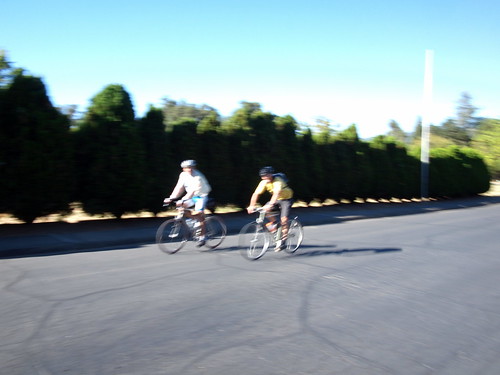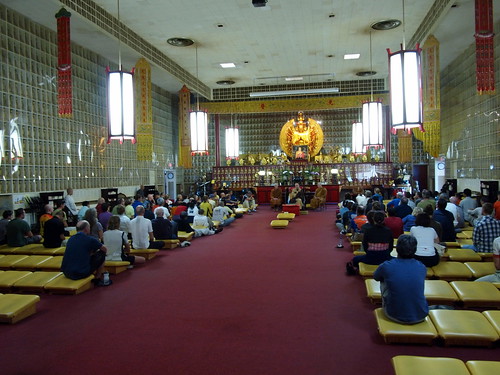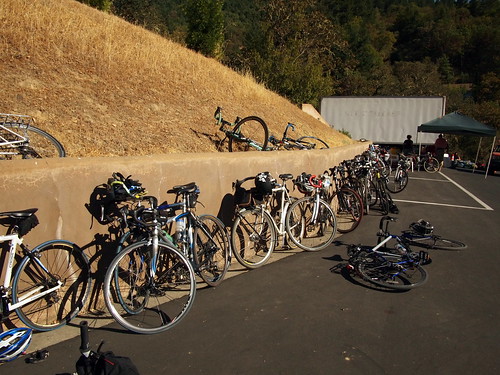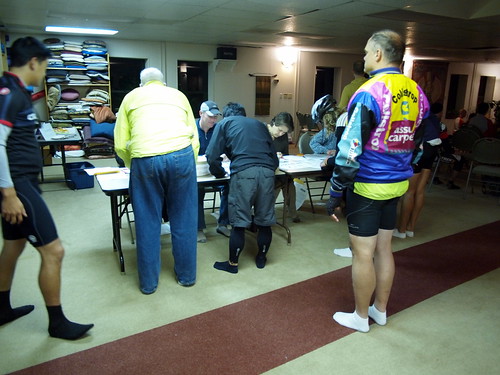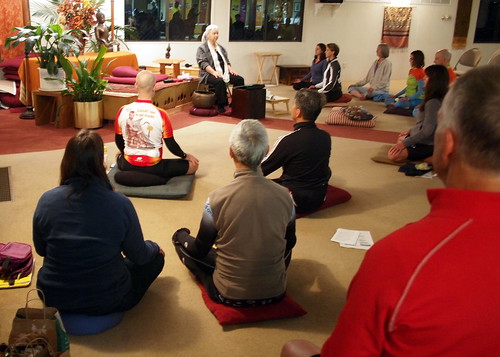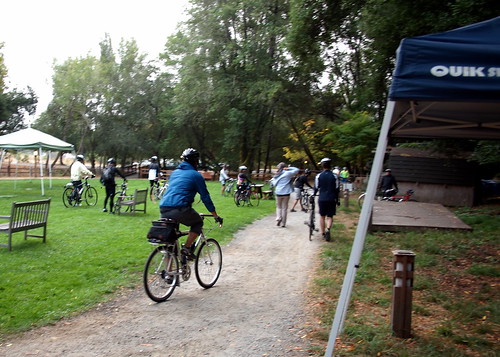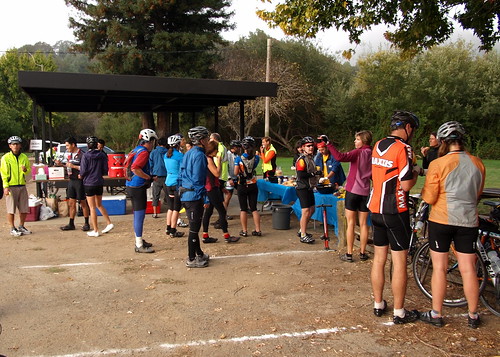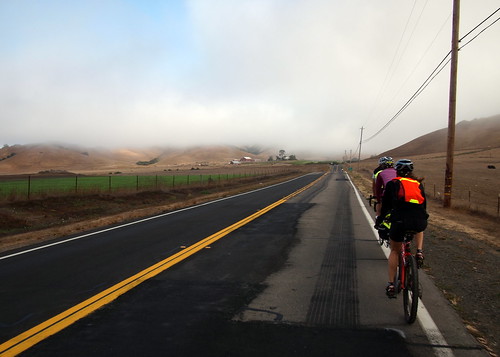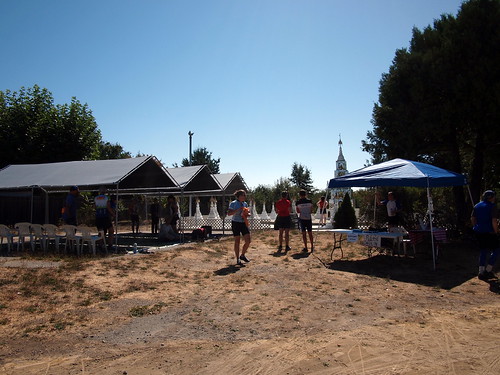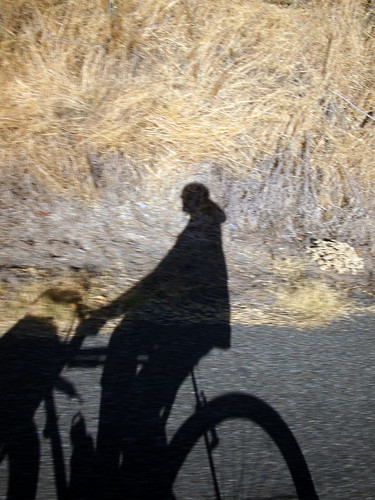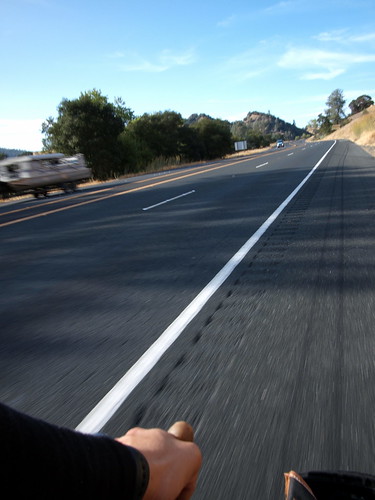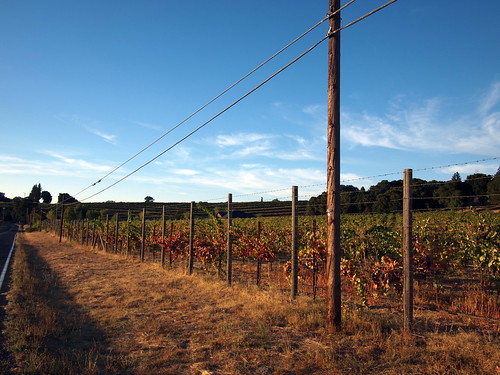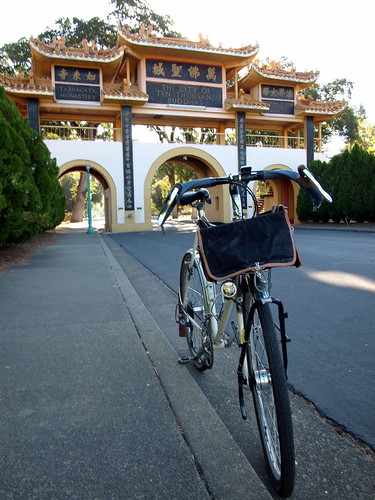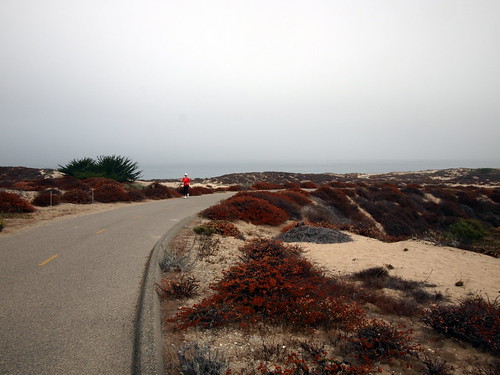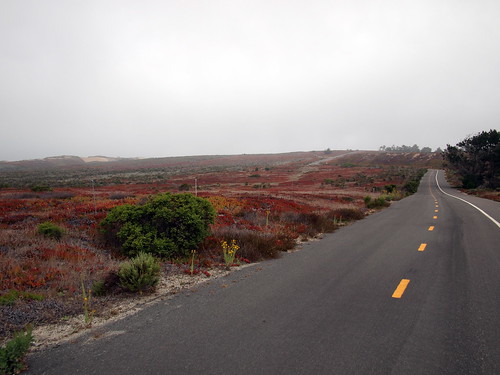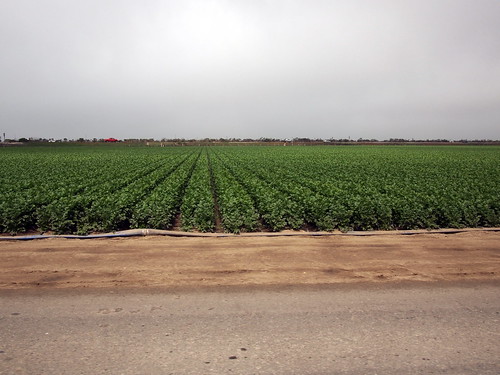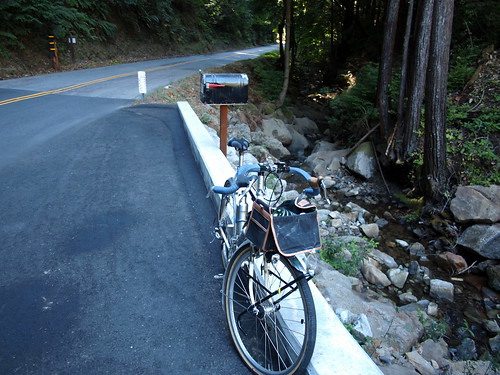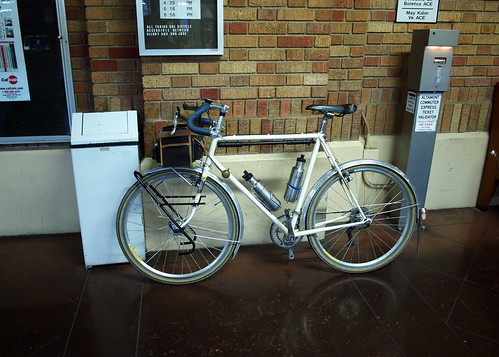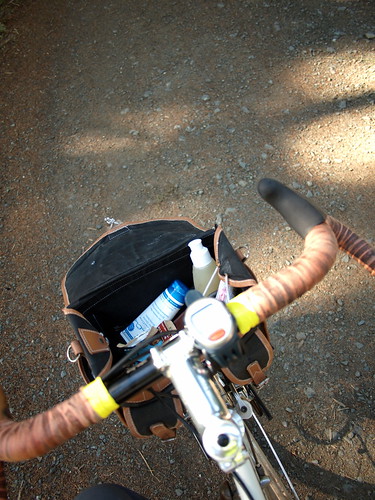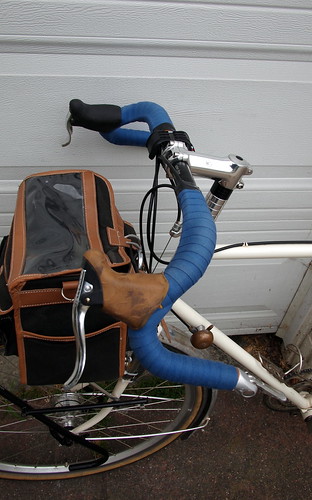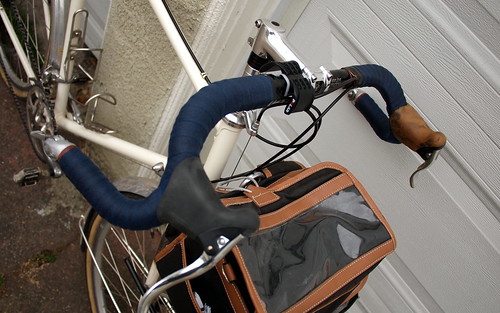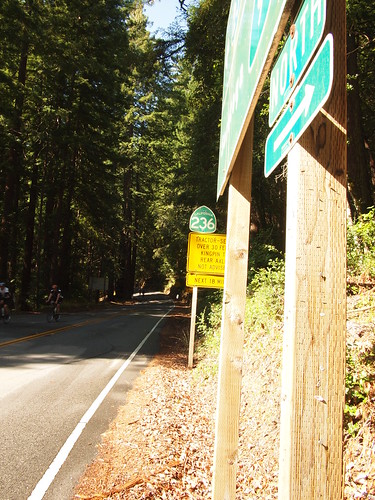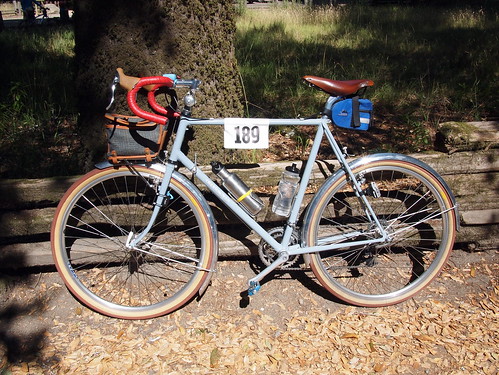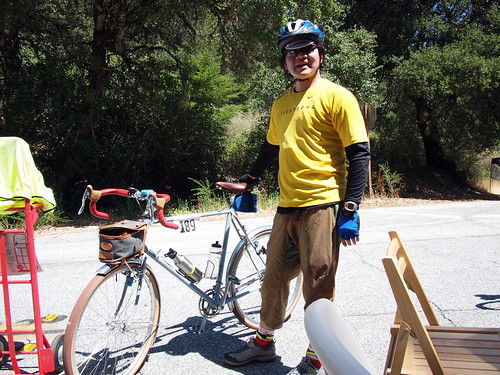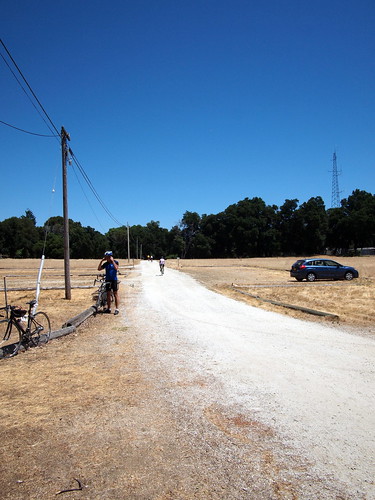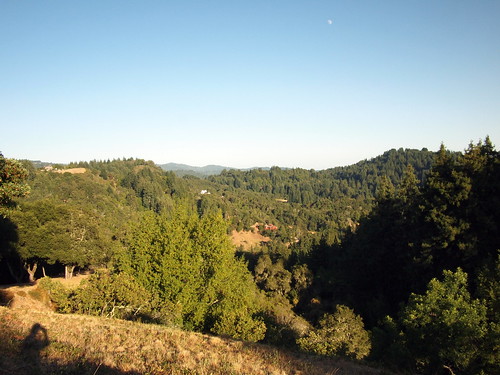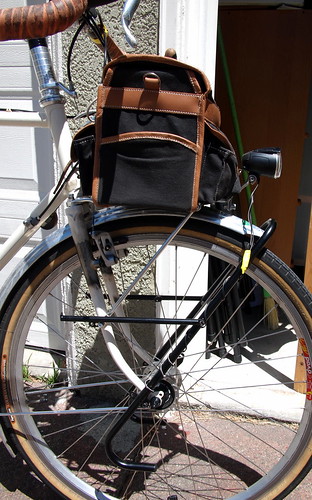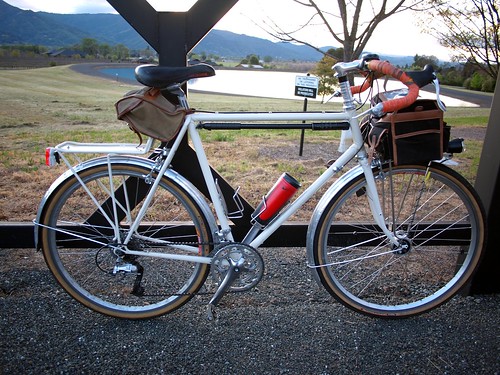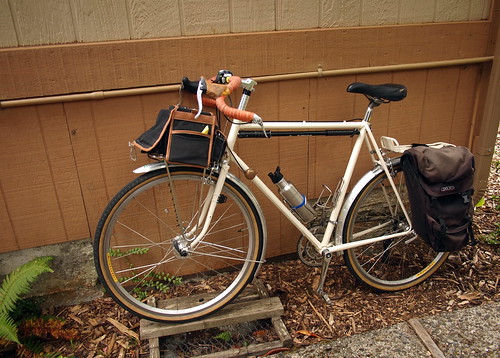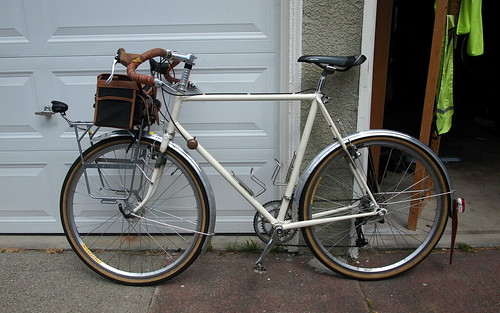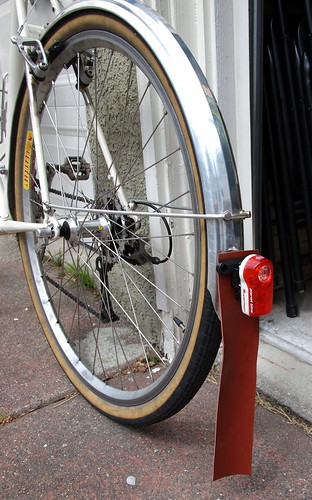The summer is more than half way over, and my tank is almost empty as I have worked all year without a real break since coming back from bereavement in February. I also just got a lung-busting cold in the middle of July that almost cost me the chance to
complete a bike ride we were training to do. I finally feel stronger again, and before diving back into work, I decided to take most of the day for a long ride.
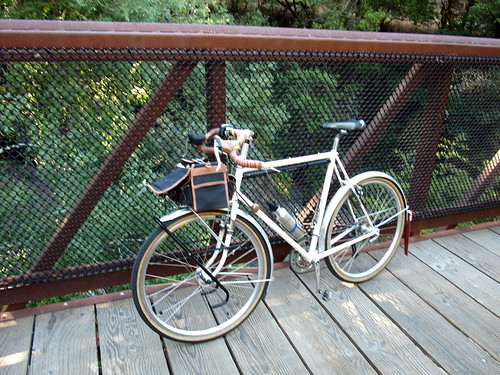 |
| Sequoia on Cross Marin Trail |
I started the day early, and got myself to San Francisco by 6:20AM via BART. I rode along the northeastern edges of the city to the bridge then crossed over on the eastern sidewalk. The entire city and most of southern Marin county was still shrouded in fog at this point. I rolled up Camino Alto and down through the hamlets--roads I have ridden so many times on San Francisco Randonneurs' brevets or otherwise. Whites Hill got my heart pumping and the subsequent flats on Sir Francis Drake kept the heart rate up. Soon I crossed a pedestrian bridge shortly after the town of Lagunita to get on the Cross Marin Trail.
 |
| Top of the hill before Olema |
A gem of a trail it is, and a great joy to ride on. The first portion is mostly dirt, but pretty packed down at this time of the year, and the speed remained high. The latter part of the trail has some newly laid down gravel that required a little more attentiveness but nothing too bad. Through the redwood groves I rolled, and in no time I was at the foot of the climb before Olema. The sky was clear by now but it was still breezy. Not many cars were on the road at this hour. I took my time getting to the top and enjoyed a fast descent. I purposely began braking a little later than usual to test the
new brakes I have on the Sequoia--avid shorty 4. Initially, when I first installed them a couple of weeks ago, they weren't so hot in terms of stopping power, and they definitely squealed. I realized that the cable carriers were sitting too high for these low-to-mid profile brakes. I have since lowered the cable yoke, and on this occasion they stopped great and were silent.
 |
| Bear Valley Visitor Center lot |
I stopped at the Bear Valley visitor center to fill up my water bottle (and I only brought one today) and eat some food. I wasn't planning on going to the lighthouse nor Marshall in the north, like the SFR 200k route, but planned on going on Limantour Road on a bike for the first time. If there was an aim today besides getting out and ride, it was to check out 1 or 2 camp sites that one can bike to. One of these sites is Sky Camp, which is reachable via 1.2 miles of hiking/biking on Sky Trail, which starts on Limantour Road.
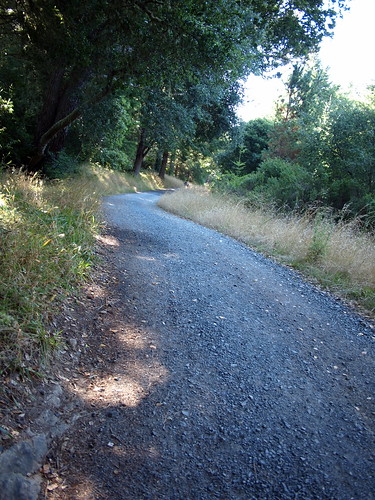 |
| Dirt on Sky Trail |
The portion of Limantour Road I was riding is a steady, 3.75-mile hill that climbs 900+ feet. Although the gradient isn't steep, it's a relatively low climb. I found a good rhythm and kept a good pace to the top. Shortly after the road flattened, I came upon the trail head for Sky Trail. Though short, the Sky Trail was much more difficult than the much longer Limantour Road. The road surface was decent, but the trail has short steep pitches around tight corners, and even though the condition of the trail is decent, there is still uneven surfaces and loose gravel to negotiate. My rear Panaracer Col de la Vie tires, which has worn ridges, slipped a couple of times. I climbed to the summit of Sky Trail, and was a fraction of a mile away from reaching the actual campsite. But I was satisfied of my finding that the trail is ridable, and the scenery very nice--we will come back for an overnighter later!
 |
| View from Sky Trail |
I was wary of the descent, mostly because I was afraid that the rear tire is too worn to provide good traction. It turned out to be OK as the brakes worked well again to keep my speed down without locking up my wheels. I got back to the trail head and was about to tackle my next off-road adventure--Inverness Ridge Trail to Mt Vision--when I realized I got a puncture on my rear tire.
Apparently a sharp piece of rock got through the worn area to the tube, and created a slow leak. I removed the culprit rock, patched up the tube, and remounted the wheel. One of the added advantage of 650b wide tires is that getting them up to 45 psi with a frame pump is relatively easy and painless (and I can't say the same about narrow tires that need to be filled up to 100 psi). I did manage to bend the nozzle a little bit. Although it showed no signs of leaking, I decided to forgo Mt Vision and instead ride down on Limantour Road to reach Pt Reyes Station quickly.
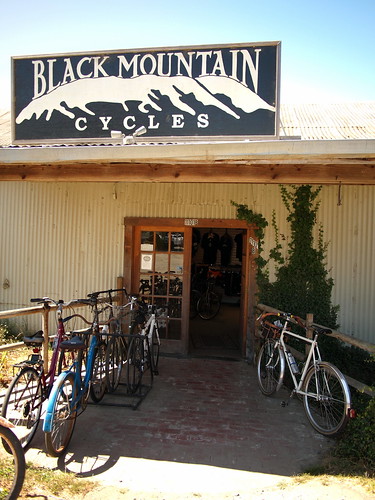 |
| Sequoia at BMC |
I stopped by Mike Varley's
Black Mountain Cycles to ask his opinion about the nozzle, and also to buy some energy food and a pair of brake pad inserts (salmon color) for the front brakes. Although these Avid Short 4 stopped great, they will stop better in wet conditions with salmon color pads. Mike said the nozzle should be OK. I pumped up the tire a little more with his floor pump now that my off-road adventures are over for the day, and the floor pump head seemed to have helped straighten the nozzle back some. After filling up my bottle and getting a piece of snack at the Bovine Bakery, I began the return leg of my ride
 |
| Rolling along HWY 1 near the Lagoon |
I had various options for getting back to San Francisco. I could go through Nicasio and rejoin Sir Francis Drake, I could retrace my step and get on the Cross Marin Trail. I decided that I haven't ridden south bound on HWY 1 to Stinson Beach, and maybe I can catch that famous north-south tailwind for the stretch. The road down to Bolinas was a set of pleasant, but not remarkable rollers. But I was definitely wrong about the tailwind, as I felt no help, and at times had to fight a headwind. The temperature got cooler as I approached the lagoon, and fog was already forming on the horizon around noon.
 |
| Resting at Stinson |
The stretch of HWY along the Bolinas Lagoon is one of the most pleasant. One is riding at water-level, and various type of migrant and non-migrant birds casually float on the water surface. The temperature seems to be always cool and the pavement is outstanding. You stay on the big ring and power through the slight roller fairly effortlessly. Soon the crowd at Stinson Beach began to emerge. I sat on the beach people-watched for a while after filling up my bottle again and ate some bars. Now I am feeling a craving for real food, but I didn't want to fight with the swarm of tourists and beach-goers in the town's small number of establishments. I rested my legs and rolled again.
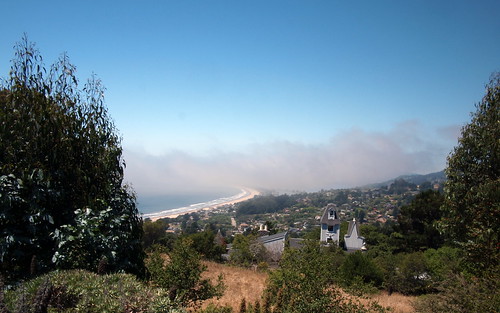 |
| View from Panoramic Hwy |
Now I have to tackle a major climb--up Panoramic Hwy to Pantoll Ranger Station. The scenic road gains 1400 ft in 4 miles, and steep in pitches on the lower sections. I tucked in on the drops, and spun up on a pretty low gear (34/28T I think most of the way), and enjoyed the scenery as I climbed up. The upper portion was much more covered and the gradient eased. It was a struggle after 60 some miles in my legs and no real food in my stomach at lunch time. The beautiful scenery and the cool breeze offered solace. I got to the ranger station huffing and puffing, but know that there is no tough climb left.
I stopped at Whole Foods in Mill Valley after dropping down from Mt Tam. I got some dolma, beet salad, and hummus at the salad bar, and a coconut water. The meal was very satisfying and gave me a second wind on my ride back to the City. After climbing up Alexander to the bridge, i had to contend with tourists on the eastern sidewalk again as the western sidewalk is only open on weekends. I was careful and rode defensively, but still got knocked over near the end by an unsuspecting tourist. The damage was a piece of lost skin on my hand and some small bruises as my right arm and hand made contact with the guard rail. After yelling at him to pay more attention, I rolled on, intending to catch BART before it becomes off-limit for bikes.
I got to BART station at 3:40, some 9 hours after I started this morning, and got back to Berkeley just after 4PM. The tally of the day--94 miles, 6500 ft of climbing, much pleasant to breath-taking scenery, and an opportunity to stretch my legs and clear my head. Jan Heine of Bicycle Quarter wrote
an excellent piece on sensible performance bicycles for non-racers that I resonated a lot. Today's journey was a good example of what he is talking about. On a steel bike with wide-tires and fenders, racks, dynamo lighting, and a decent-sized bag, I was able to travel on both paved and unpaved surfaces, and traveled a lot of distance and rode some difficult terrain in not quite a day. The bike--
an 80's Specialized Sequoia--has a frameset with standard-size tubes (not over-sized) that's lighter and more responsive, and allows the bike to stay under a reasonable weight even with all the "added" features mentioned above. I am by far not a fast cyclist, as I always finish in the bottom quartile of SFR brevets, but with a bike that's somewhat aimed at performance and a basic level of fitness, I get to go far today without rushing and enjoy the spectacular amazing coastal California scenery.
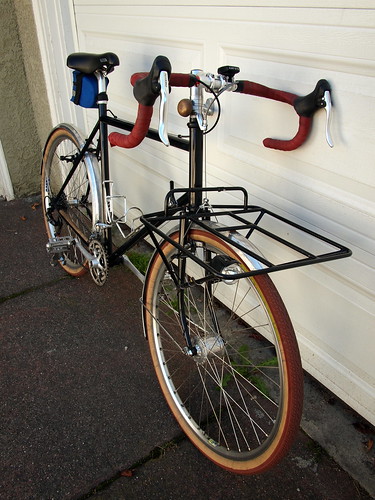 My Kogswell P/R porteur is my go-to bike around town and even takes on occasional short brevet duty. It's got a big porteur rack from Roseland that attaches to the fork crown and mid-fork braze-ons. I also have a custom front boxy porteur bag from Ruth Works Bags. Slowly, the bike's color scheme has moved toward red and black.
My Kogswell P/R porteur is my go-to bike around town and even takes on occasional short brevet duty. It's got a big porteur rack from Roseland that attaches to the fork crown and mid-fork braze-ons. I also have a custom front boxy porteur bag from Ruth Works Bags. Slowly, the bike's color scheme has moved toward red and black.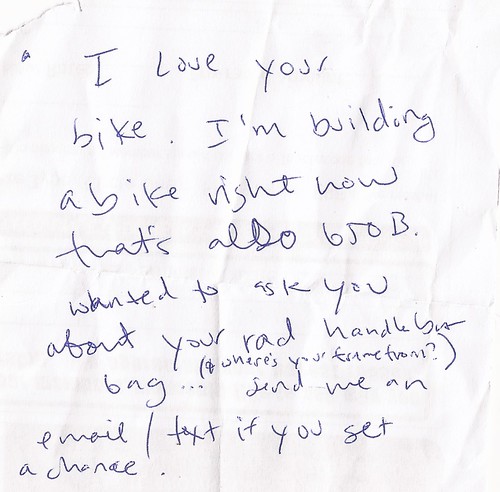 The frame is black, as well as the saddle, the brakes, the rear derailleur, the downtube shifters, the rack, and the bag. Red parts are less numerous, but certainly stand out--handlebar tape, derailleur pulleys, and now tires, which are Soma B-line tires. I like them in black, but I like them in red even more. They are nice, smooth and quiet tires that are cheaper and last longer than my other favorite Grand Bois red Hetres. I really like how my bike looks and functions right now, apparently, someone else thinks so, too.
The frame is black, as well as the saddle, the brakes, the rear derailleur, the downtube shifters, the rack, and the bag. Red parts are less numerous, but certainly stand out--handlebar tape, derailleur pulleys, and now tires, which are Soma B-line tires. I like them in black, but I like them in red even more. They are nice, smooth and quiet tires that are cheaper and last longer than my other favorite Grand Bois red Hetres. I really like how my bike looks and functions right now, apparently, someone else thinks so, too.
